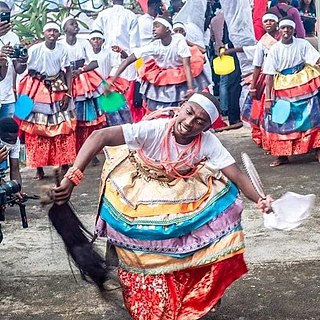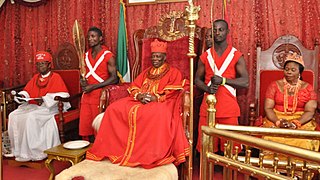
Ughelli is a town in Delta State, Nigeria, and one of the 24 kingdoms that make up the Urhobo Nation. It also serves as the headquarters of Ughelli North local government area of Delta State. The city is indigenous to the Urhobo ethnic nationals, but there is a mixture of several other tribes from the country & abroad. It is an industrial and agricultural spot of Delta State.

The Itsekiri are one of the fundamental Yoruba subgroups in Nigeria's Niger Delta area, They originate from Ile-Ife and speak a Yoruboid language and can be found in Ondo, Edo and Delta State. The Itsekiris presently transcends a population of over 1 million people and live mainly in parts of Ondo, Edo and majorly in the Warri South, Warri North and Warri South West local government districts of Delta State on the Atlantic coast of Nigeria.
The Edoid languages are a few dozen languages spoken in Southern Nigeria, predominantly in the former Bendel State. The name Edoid derives from its most widely spoken member, Edo, the language of Benin City, which has 2 million native and secondary speakers.
Agbassa is the name of one of the two Urhobo kingdoms in Warri South Local Government, Delta State, Nigeria, the other being Okere-Urhobo. The name 'Agbassa' is of British origin derives from its original name 'AGBARHA', which is still in use. The current king is H.R.M Kingsley Orereh ,.

Isoko people are an ethnolinguistic group who inhabit the Isoko region of Delta State and Bayelsa State, Nigeria. They are people of southern Nigeria, near the northwestern Niger delta. Delta State and Bayelsa State are part of the 36 states of the Federal Republic of Nigeria.
Urhobo is a South-Western Edoid language spoken by the Urhobo people of southern Nigeria. It is from the Delta and Bayelsa States.

Okpe is a kingdom in Delta State, Nigeria. Today, it is also the name of a local government area. It is one of the many kingdoms that make up Urhobo nation. Its capital is Orerokpe. The kingdom plays host to the Osubi Airport, which is actually located at Osubi and the Delta State Trade Fair Complex. The Orodje celebrated ten years on ancestral throne. Major General Felix Mujakperuo is the king of Okpe Kingdom. The kingship is usually rotated between the four ruling houses.

Abraka, is a town in Delta state, Nigeria. It is also home to two of the main 24 urhobo kingdoms. It is mostly known as a university town and has the main campus of the Delta State University located there. Abraka town is a favourite destination for domestic and international tourists. The Abraka beach is famous for its natural flowing spring water, and has sports recreational facilities for outdoor activities like canoeing, fishing, swimming, barbecue and picnicking.
Agbarha Otor (Agbarha-Otor) is a town and one of the Urhobo kingdoms in Ughelli North Local Government Area of Delta State. The town is home to the wealthy and renowned Ibru Family. Besides primary and secondary schools, Agbarha-Otor has a private university, namely Michael and Cecilia Ibru University and a private Airstrip built in 1972 by Michael Ibru. It also houses the 222 Battalion of the Nigerian Army and the now moribund SuperBru, a malt producing company.
Ovu is a town in Southern Nigeria in Delta State and part of Agbon Kingdom and His Royal Majesty, Ogurime-Rime Ukori I is the current King and Ovie of Agbon Kingdom.
John Odigie Oyegun is a Nigerian politician who served as the first national chairman of All Progressives Congress (APC) in Nigeria. He was the executive governor of Edo State between 1992 and 1993, during the aborted Nigerian Third Republic.

Felix Ovudoroye Ibru was a Nigerian businessman, architect and politician. He was the first democratically elected Governor of Delta State and Senator for Delta Central Senatorial District. Until his death he held the position of President General of the Urhobo Progressive Union (UPU). As a traditional chieftain of his homeland, Ibru bore the tribal honorific Olorogun and often used it as a pre-nominal style. This title is also borne by the members of his large family in the same way.
The Urhobos are people located in southern Nigeria, near the northwestern Niger Delta.
The Agbon Kingdom is one of twenty-four subunits of the Urhobo people that have been in existence since before the rise of the Benin Empire in the 1440s and before the arrival of the Portuguese in the Western Niger Delta in the 1480s.
Ufuoma Isioro Onobrakpeya, is a Nigerian painter, printmaker and teacher of art. Ufuoma is a 3rd generation artist, whose grandfather Obi Omonedo Onobrakpeya was a carver. While growing up he was also art apprentice to his father Bruce Onobrakpeya for a period of 2 decades.
According to the language family tree classification by Ethnologue, Okpe, Urhobo and Uvwie, alongside Eruwa and Isoko, make up the five Southwestern Edoid languages of the Benue-Congo group. Quoting Johnstone (1993), Ethnologue puts the population of Urhobo people at 546,000, Okpe 25,400 (2000) and Uvwie 19,800 (2000). These three languages have geographically neighbouring languages: Izon and Itsekiri to the west and south, Ukwuani and Isoko to the east and Edo to the north. Thus, Isoko and Urhobo are similar languages that belong to the same linguistic family.
Chamberlain Oyibocha Orovwuje, Ogurimerime I, was the Ovie of Agbon Kingdom from 1958 till 2012. He was also the former chairman of Delta State Council of Traditional Rulers. He ruled the traditional kingdom of Agbon for 54 years and clinched the title of the longest reigning monarch in Delta State.

Onigu Otite was a Nigerian sociologist. He was among the first set of students to attend the first indigenous Nigerian university - University of Nigeria, Nsukka. He wrote several books including The Urhobo People, On the Path of Progress, Ethnic Pluralism and Ethnic Conflicts in Nigeria, and Introduction to Sociology which he co-authored with William Ogionwo. The Urhobo Studies Association USA Chapter regard him as one of the earliest Urhobo scholars to focus attention on the culture and history of the Urhobo People of the Niger Delta.
Okere-Urhobo is the name of one of the two Urhobo kingdoms in Warri South Local Government, Delta State, Nigeria, the other being Agbassa.

Saint Gideon Meriodere Urhobo was the founder of God's Kingdom Society (GKS). He served as its life president from its inception in 1934 till his passing in 1952. The God's Kingdom Society (GKS) spread from Warri in Delta State to many parts of Nigeria as a sabbatical movement with doctrine which resembles the Jehovah's Witnesses. It was involved in the struggle for the independence of Nigeria in the 1950s. By the 1960s, it grew to over 2,000 members. Bro. Ebenezer T. Otomewo succeeded him as president in 1952 under whom the Church spread to most cities in Nigeria and London. Today, the church is presided since 1997 after the death of Otomewo.by Emmanuel Oseghale Aighalua, a solicitor and barrister of the Supreme Court of Nigeria. God's Kingdom Mission split from God's Kingdom Society on January 5, 1991, through the efforts of Brother Benjamin O. Tietie, who served as the first Archminister of the Mission. Pastor David O. Amanoritsewo also broke away to form the Acceptable Christian Church, with similar doctrines as those of God's Kingdom Society (GKS).







